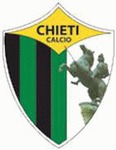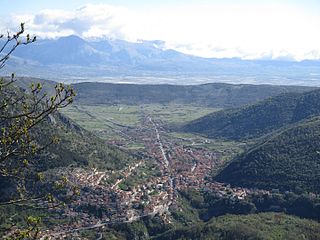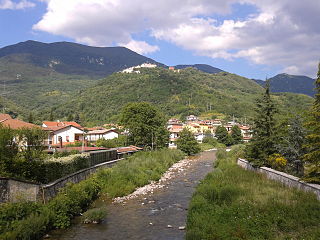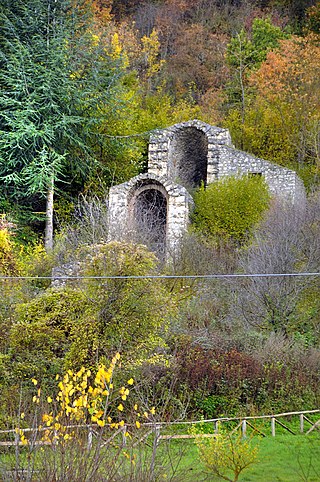Pope Boniface IV, OSB was the bishop of Rome from 608 to his death. Boniface had served as a deacon under Pope Gregory I, and like his mentor, he ran the Lateran Palace as a monastery. As pope, he encouraged monasticism. With imperial permission, he converted the Pantheon into a church. In 610, he conferred with Bishop Mellitus of London regarding the needs of the English Church. He is venerated as a saint in the Catholic Church with a universal feast day on 8 May.

Abruzzo, historically known as Abruzzi, is a region of Southern Italy with an area of 10,763 square km and a population of 1.3 million. It is divided into four provinces: L'Aquila, Teramo, Pescara, and Chieti. Its western border lies 80 km (50 mi) east of Rome. Abruzzo borders the region of Marche to the north, Lazio to the west and north-west, Molise to the south and the Adriatic Sea to the east. Geographically, Abruzzo is divided into a mountainous area in the west, which includes the highest massifs of the Apennines, such as the Gran Sasso d'Italia and the Maiella, and a coastal area in the east with beaches on the Adriatic Sea.

The Marsi were an Italic people of ancient Italy, whose chief centre was Marruvium, on the eastern shore of Lake Fucinus. The area in which they lived is now called Marsica. They originally spoke a language now termed Marsian and attested by several inscriptions.
Castel di Sangro Cep is an Italian association football club from Castel di Sangro in the Province of L'Aquila, Abruzzo. They currently play in Eccellenza Molise.

Giulianova Calcio S.r.l. was an Italian association football club based in Giulianova, Abruzzo. The team failed to renew its license for professional football in 2012. After 4 years' dormancy, the new owner of the club applied to play in 2016–17 5-a-side football, composed of players from folded Città di Giulianova.

Società Sportiva Chieti Calcio is an Italian association football club, based in Chieti, Abruzzo. Currently it plays in Serie D.

Associazione Sportiva Dilettantistica Vastese Calcio 1902 is an Italian association football club based in Vasto, Abruzzo. The club was founded in 1922 and subsequently refounded in 1981 and 1995. As of summer 2010 the club is dissolved, and reformed in 2012 as Vastese Calcio 1902. It plays in Serie D.
Atessa Val di Sangro A.S.D. 2012 is an Italian association football club from Atessa, Abruzzo. It currently plays only in the youth sector: the main team is that of Allievi Regionali Abruzzo in the group B.

Capistrello is a comune and town in the province of L'Aquila in the Abruzzo region of central-southern Italy. It is located at the border between the upper Liri River valley and the Marsica. Capistrello borders the following municipalities: Avezzano, Canistro, Castellafiume, Filettino (Frosinone), Luco dei Marsi, Scurcola Marsicana and Tagliacozzo.

Canistro is a comune (municipality) and town in the province of L'Aquila in the Abruzzo region of central Italy.

Luco dei Marsi is a comune and town in the province of L'Aquila in the Abruzzo region of central-eastern Italy. It is part of the Marsica.

Avezzano Calcio Ar. L. is an Italian association football club located in Avezzano, Abruzzo.
Eccellenza Abruzzo is the regional Eccellenza football division for clubs in Abruzzo, Italy. It is competed amongst 18 teams and the winner is promoted to Serie D. The clubs that finishes between the second and the fifth place also have a chance to gain promotion. The winner of the regional play-off is entered into a national round which consists of two matches.

Marsica is a geographical and historical region in the Abruzzo, central Italy, including 37 comuni in the province of L'Aquila. It is located between the plain of the former Fucine Lake, the National Park of Abruzzo, Lazio and Molise, the plain of Carsoli and the valley of Sulmona.

The 2011–12 Serie D was the sixty-fourth edition of the top level Italian non-professional football championship. It represented the fifth tier in the Italian football league system. It consisted of 168 teams divided into six 18-team divisions and three 20-team divisions.
Associazione Sportiva Dilettantistica Sulmona Calcio 1921 is an Italian association football club, based in Sulmona, Abruzzo.

Lucus Angitiae was an Italic and Roman town and sanctuary with temple of the goddess Angitia, the ruins of which are located in the comune of Luco dei Marsi in the Abruzzo region of Italy.
Vincenzo Vivarini is an Italian professional football coach. He is in charge of Serie B club Catanzaro.

The Tunnels of Claudius consist principally of a 6 km-long tunnel together with several monumental service tunnels which Roman Emperor Claudius had built by 52 AD to partially drain the Fucine Lake in Abruzzo, protecting riparian villages from floods and creating agricultural land. It was a massive engineering project involving 30000 workmen and slaves who completed it in just 11 years, and considered among the grandest in antiquity. It was the longest tunnel ever built until the inauguration of the Fréjus Rail Tunnel in 1871.

The Valle Roveto or Val Roveto is an Apennine valley, located in the Abruzzo Apennines, in the province of L'Aquila, in Marsica, a geographical and historical central Italian region. The Valley is crossed by the river Liri and is part of the larger Valle del Liri.














